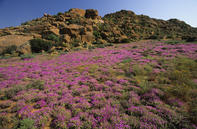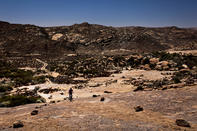'The Waterhole'
One of the most popular flower destinations in Springbok, Northern Cape is the Goegap Nature Reserve, a conservation area covering about 15 000 ha. It was first established when the Okiep Copper Company donated 4600 ha of agricultural land to the Cape provincial administration for the development of a wildflower reserve.

This was duly opened in 1966, and named by Nico Malan in honour of his wife. Later, the farm ‘Goegap’ (meaning ‘waterhole’) was bought by Cape Nature and Environmental Directorate and added to the reserve. Today, this well-established facility has a tea garden and a nicely laid out succulent nursery with interpretive signs and attractive rock gardens.
There is also a 13 km-17 km gravel road which leads through a lovely landscape of boulders and koppies. It is easily accessible for most cars and is highly recommended. When the flowers are in bloom, the plains along this road are swathed in orange and yellow cloaks, making it very popular with photographers and TV crews. A total of 581 plant species have been recorded in the reserve, plus 45 mammals, 25 reptiles, 3 amphibian and 94 bird species.
Explore Further

If you wish to explore further, the reserve has about 65 km of rougher 4x4 roads for those with appropriate vehicles. There are also a couple of walking trails and mountain bike routes. Tourist facilities are rounded out by a picnic spot, campsites and a very reasonable guest house.
To reach Goegap, head out of Springbok towards Pofadder. Just after you cross the N7, you’ll find a turn-off for the tarred R355, which is marked for the reserve, the airport and the Springbok caravan park. A short distance later, you’ll pass the golf course and country club.
During flower season, the greens and fairways of this establishment are surrounded by beautiful dollops of daisies. About 10 km from Springbok, you’ll see a turn off for the Goegap reserve. If you keep going on the R355, the road turns to gravel and continues in a south-easterly direction to Platbakkies and, eventually, Loeriesfontein on the Bokkeveld plateau.
By David Fleminger